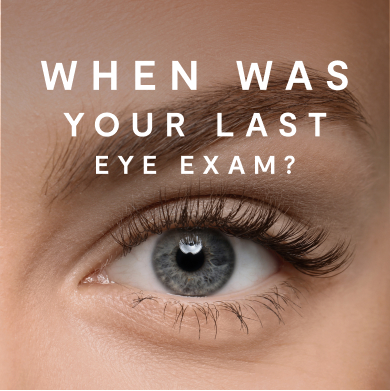

Answers to frequently asked questions
When it comes to choosing the right eyewear for your eyes and lifestyle, information is key. Read below to find helpful answers to Frequently Asked Questions (FAQs) about JCP Optical, eye exams, frames and lenses, contact lenses, and more.
General FAQs
To find an optometrist, check out our Store Locator.
The American Optometric Association recommends having your eyes examined by an eye doctor every year from about the age of three, unless eye problems exist that warrant more frequent visits. If you are experiencing any sort of unusual eye discomfort or changes in vision, call your Eye Doctor immediately.
Your eye doctor will ask questions about your vision and overall health. Visual Acuity is then checked by reading a standard eye chart. A numeric value is assigned for each eye, such as 20/20 vision or excellent vision, or 20/40 for poorer vision. The larger the bottom number of the fraction, the worse the vision. The Doctor will then put eye drops in the eyes to dilate, or open the pupils. Once dilated, he/she will look into each eye with an ophthalmoscope, an instrument through which the eyes’ internal structures can be seen. The ophthalmoscope allows the doctor to check the internal health of the eyes. The surface of the cornea, the outermost portion of the front of the eye, is then examined. A Glaucoma test may be given which measures the pressure inside the eyeball. Glaucoma is a disease of the eye where increased pressure inside the eyeball causes damage and results in a gradual loss of vision. You may also be given tests to determine color patterns and depth perception. Ask your healthcare provider which tests are right for you. Be sure to discuss all concerns and questions.
Normal results mean that no problems were discovered, that your vision is 20/20, or can be corrected to 20/20 with glasses and/or contacts, you can see colors, and there is no evidence of glaucoma or cataracts. Results vary and can include the following:
- Astigmatism: the visual condition resulting from two unequal opposite meridians of the eye which produce two separate focal lengths and blurred vision
- Blocked Tear Duct: blockage in the tube that carries tears away from the eye
- Cataracts: clouding of the crystalline lens in the eye that can decrease visual clarity
- Color Blindness: the inability to see certain colors
- Damage to the optic nerve, blood vessels, or fundus
- Eye Trauma: injury to the eye
- Glaucoma: a disease of the eye where increased pressure inside the eyeball causes damage to the optic disk and gradual loss of vision.
- Hyperopia: or farsightedness, which is the ability to see far objects better than near objects
- Lazy Eye/Strabismus: the condition where one eye achieves fixation, but the other eye drifts in another direction resulting from an eye muscle weakness.
- Myopia: nearsightedness, which is the ability to see near objects better than far objects.
- Presbyopia: condition of vision due to aging and a diminished power of accommodation which requires the use of bifocals for clear near vision (reading).
Yes, we welcome you to do so.
There are so many choices of frame styles today; different shapes, different materials, different colors. To find the shape that’s right for you, look at the structure of your face. The right eyeglass frame will contrast the shape of your face, repeat your best feature and be in scale with the size of your face.

After you’ve chosen a shape that’s right for you there are so many more options. Frame materials such as titanium, stainless steel and plastic, as well as special features such as drilled rimless, flexible hinges and silicone nose pads are just a few of the many choices. We also carry some of your favorite brands, such as Joneswear, Neostyle, Guess, Laura Ashley, Eddie Bauer, and more! An eyecare professional at any JCP Optical Eyecare Center can help you choose the look that’s right for you!
The best way to choose a lens and lens treatments is to let an eyecare professional show you lens and lens options that would be best for you, based on your prescription, job, hobbies and lifestyle. Do you need a lightweight lens? Impact resistant? Is glare a problem? Do you want your eyeglass lenses to darken in the sun? Do you have trouble seeing while driving at night? What about eyestrain from the computer? At JCPenney Optical Centers, we carry all of the latest, technologically advanced lenses available – and the old standards, too! Your lens choice and Rx may also have an impact on what frame you can wear, so be sure to discuss all of your needs with us at the time you make your selection.
Your eyeglass purchase is protected against manufacturer defects for 30 days from the pick up date. In addition to this warranty, you can also purchase our one-year Eyewear Protection Plan (EPP). The EPP covers breakage, prescription changes for up to 6 months, and a one-time replacement for lost or stolen glasses. Copays apply. Ask an optician for more details on why the EPP is an excellent investment to protect your eyewear from the unexpected.
Yes, we will refit and readjust your eyeglasses at no charge for as long as you own them.
At JCPenney Optical Eyecare Centers, our goal is to meet our customers expectations, Every customer, Every day, Every time! We will do all that we can to ensure you have a positive experience, but if you do have a concern We’re Here for You! If after contacting the Eyecare Center’s manager you still have concerns, please call our OPTICAL HELP LINE at 1-866-HELP-111
We do not offer eyeglasses or eyeglass frames for purchase on-line for several reasons. The most important reason is fit. Even if you have a prescription for lenses, we need to measure your eyes. Eyeglasses are a custom order. It is best to try on the frames before you buy them to make sure they are the proper height and width for your face and that they are comfortable to for you to wear. You will also want to make sure that the shape and color look good on you. After all, your eyeglasses will be a part of your everyday look and we want you to be satisfied that you have made just the right choice!
At JCPenney Optical’s Centers, we have hundreds of men’s, women’s and children’s frames to choose from and new styles are always arriving. We also offer great deals on some designer names that we can’t mention in our advertising. For the most current selection and best pricing, stop into your local JCP Optical Eyecare Center today and speak to one of our knowledgeable eyecare professionals. You’re sure to find something great at an even better price!
Hours vary by location. Check out your local store’s hours here.
JCPenney Optical’s Eyecare Centers will accept cash, check, Visa, MasterCard, Discover, and American Express credit cards. JCPenney Optical Centers located in a host department store will also accept the host department store’s credit card. A payment in full is required on all eyeglass orders because the lenses are custom make for your personal visual needs and can be worn by no one but you.
FAQs about contact lenses
Today, contact lenses can be worn by almost everyone – even if you have astigmatism. Your healthcare provider can recommend the right type and brand for your eyes and lifestyle. Here is a list of some of your options:
- Disposable Contact Lenses: Depending on the type, these can be worn and thrown away after a single use or a period of one or two weeks. Since they do not have to be cleaned and maintained, they are ideal for those with busy lifestyles.
- Extended Wear Contact Lenses: Can be worn when you are asleep, either overnight or for up to one month. They make it easy to see the world clearly from the moment you wake up.
- Colored Contact Lenses: Change or enhance your eye color. Available in many different colors and shades and can be worn every day or just on special occasions. You may use contact lenses to change your eye color even if you don’t need vision correction. To do this, you will need a regular contact lens exam with the eye doctor as well as care and cleaning instructions, just as you would if you needed them to correct your eyesight.
- Toric Contact Lenses: Designed for people with astigmatism.
- Bifocal Contact Lenses: Designed for people with presbyopia (the need for reading glasses). They have specific areas for distance and near viewing.
- Monovision Contact Lenses: Used for people with presbyopia. One eye is fit with a lens for distance, the other eye with a lens for close-up.
- Gas Permeable Contact Lenses: A rigid contact lens composed of a combination of hard plastic and silicone (an oxygen permeable material). Ask your health care provider if they are right for you.
Even if you wear contact lenses every day, it’s a very good idea to buy at least one pair of eyeglasses to use as a back-up, in case of infection or injury that would temporarily prevent contact lens wear, or when you want to rest your eyes. You may lose your contact lenses or run out of them. Also, you may want a pair of prescription sunglasses or computer eyeglasses. Discuss all of the eyewear options with your healthcare provider.
Even if you are just ordering contact lenses for cosmetic purposes and do not need vision correction, you still need a current prescription. Why? Everyone’s eyes come in different shapes and sizes. An Eye Doctor will measure the curvature of your eye and prescribe the right power, curve, type and brand of contact lenses best for you and your lifestyle. This will ensure you are getting a product that will provide the best safety and comfort.
You may be able to, but only your Eye Care Professional can tell for sure.
You should always check with your Eye Care Professional when changing, as mixing even approved solutions can occasionally cause problems.
Yes, but you should use eye drops specifically recommended for use with contact lenses. Check with your Eye Care Professional, or the eye drop manufacturer, for additional information.
It is not recommended that the lenses be used past the expiration date printed on the package.
No, the mouth is not a sterile environment. Use the lens care products recommended by your doctor.
Yes, contact lenses provide exceptionally sharp, clear vision and your don’t have to worry about them falling off, breaking or fogging up. It also is easier to wear sports goggles with contact lenses.
Many contact lenses can be worn overnight or while you sleep. Your doctor can determine if any of these lenses would be right for you.
No, it is not possible for a contact lens to become lost in your eye.
No, contact lenses are a medical device, and were fit for the shapes and sizes of your eyes.
Yes, you may use contact lenses to change your eye color even if you don’t need vision correction. To do this, you will need a regular contact lens exam with the eye doctor as well as care and cleaning instructions, just as you would if you needed them to correct your eyesight.

